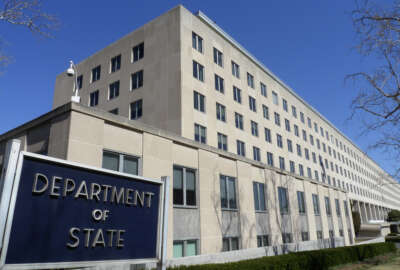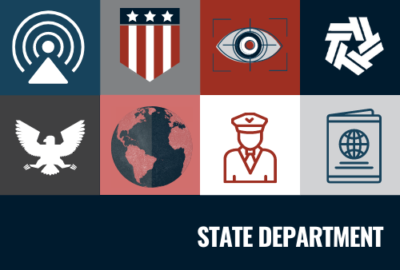

The State Department, once a relative stranger to telework for most functions prior to the COVID-19 pandemic, is taking steps to allow Foreign Service candidates to...
Best listening experience is on Chrome, Firefox or Safari. Subscribe to Federal Drive’s daily audio interviews on Apple Podcasts or PodcastOne.
The State Department, once a relative stranger to telework for most functions prior to the COVID-19 pandemic, is taking steps to allow Foreign Service candidates to participate in some assessments virtually.
Don Bauer, the chief technology officer of the department’s Global Talent Management Bureau, said the bureau is “virtualizing everything” it does to assess Foreign Service candidates, in an effort to diversify its pool of applicants.
Bauer said the agency, as part of a broader rethinking of the future of work, is taking steps to allow Foreign Service candidates to conduct structured interviews virtually, starting next year, without having to travel to Washington, D.C.
“We’re very encouraged that we can start allowing a lot more people to participate in the process. And hopefully, that’ll increase our diversity,” Bauer said on Sept. 27 at an ATARC event on workforce transformation.
This is just the latest in a series of changes to how the department will screen Foreign Service candidates. The department, since July, no longer uses Foreign Service Officer Test scores as the sole criterion for who moves on to the next steps of the selection process.
Support for virtual assessments began at the end of last year, when the department began renovating nine rooms in one of its downtown Washington buildings to accommodate virtual interviews.
“We’re getting large-screen monitors and everything, so we can do virtual structured interviews, so we don’t require these people to schlep to D.C. to sit in front of us,” Bauer said.
The department, as part of its workforce barrier analysis work under Chief Diversity and Inclusion Officer Gina Abercrombie-Winstanley, found the Foreign Service wasn’t drawing many candidates from the West Coast for in-person assessments.
“The State Department is very East Coast-heavy, because if you have to come to D.C., it really excluded much of the western U.S. unless you had a lot of money and could pay your own way to get to the department,” Bauer said.
The bureau is also working on virtualizing the case management work Foreign Service candidates go through as part of their assessments.
“This is one of those where they give them a package of information and a very short amount of time, and they’re supposed to basically demonstrate critical-thinking skills. They have to come up with an answer or solution or recommendation, and that’s really like the diplomat, in the heat of the moment at these different locations, that it’s supposed to simulate,” he said.
Bauer said these changes are informed by a recent analysis of Foreign Service Officer Exams and case management studies over the 20 years.
“We looked at the results of these case studies, and this structured interview and this Foreign Service Officer Exam as inputs, and said, ‘We can, with reasonable certainty, predict the success of a Foreign Service officer with these particular pieces of information, that didn’t necessarily rely solely on the Foreign Service Officers Exam,’ and would allow us to kind of broaden the scope of what we’re doing,” he said.
The drive to move more functions online stems from the department’s broader rethinking of the future of work.
“The pandemic was really a game-changer for us in a lot of ways. The State Department notoriously never teleworked. That was, like, never done. We’re kind of a quasi-intelligence agency, everybody has a clearance where we work,” Bauer said.
That all changed, however, when the department sought an exception from the Office of Personnel Management that would allow it to swear-in new Foreign Service officers virtually.
“Through that process, people were like, ‘Wait a minute, we might be able to do some more things virtually with our workforce,’” Bauer said.
The State Department earlier this year launched a mobility assessment tool that allows supervisors and managers to determine the amount of telework allowed for each position.
“If you’re 100% telework, we allow people to do remote work agreements. We do domestic telework overseas, so we’ve really worked hard to provide some of those flexibilities, like OPM’s been doing for years, because we know those are retention incentives for our employees,” Bauer said.
Bauer’s office changed significantly with workplace flexibilities. While the department has resumed “full operations,” he said only about 10-15% of his staff are coming into the office.
“Prior to the pandemic, I had two floors, packed to the gills with people. But we’re managing to do all our work. A lot of technology, a lot of work from a policy standpoint, but we managed to actually do it,” Bauer said.
About 30 employees, out of a team of about 350 workers, are working in-person on any given day. Some of those in-person workers staff the VIP help desk team for senior executives who regularly work in the office.
“It took me three years to get laptops that were secure and could do administrative support, like server management and [database administration] and stuff like that. We have two PIV cards and all kinds of special encryption and everything certified and approved, both for cyber and information assurance and all that, but now my guys can do server management remotely,” Bauer said.
Bauer said a telework-friendly State Department helps his office recruit and retain in-demand talent.
“There are people who said, ‘If you tell me I have to come back to the office, I’m quitting,’ because they can go on Indeed today and probably find 15 jobs that are fully remote,” Bauer said. “So to be competitive, you’re going to have to do it. And honestly, who wants to schlep in the traffic and sit there and pay $280-300 a month for parking, plus gas? It starts to get really expensive.”
Bauer said his office is also taking steps to re-skill and provide training to employees as part of its employee retention efforts.
“What we’re finding through attrition is people leave because they don’t get ahead, and the only way to get ahead is to get training and to get re-skilled. It’s all getting to a point where we recognize that we need individual development plans and succession planning,” he said.
Bauer said the department previously launched pilots in which employees would submit their resumes, in the hopes of finding other career opportunities within the department. But more recently, the department is reinvigorating career planning efforts that include retraining and re-skilling employees into new positions.
“Everybody knows in the federal workforce, the first thing to go is your training budget. We have money, but obviously, we’re just now ramping back up from the pandemic, because a lot of the classes were in person and things like that,” Bauer said.
The State Department is also taking steps to bring on new hires more easily.
The department rolled out a new onboarding platform, “Welcome to State,” in September, and has brought 700 Foreign Service candidates into the agency using the new platform.
“It’s working very well. We put in your data once, it fills in all your forms,” Bauer said, adding that the forms are then routed internally to the offices that need them.
Bauer said the department has also held talks with OPM to ensure new hires get their benefits on the first day of their federal service.
“We are actually lobbying to get benefits on day one of federal service. It’s going to require a rule change in the federal government, but we’re kind of leading the way to do that, because we can get them all the documents in time,” he said.
Copyright © 2025 Federal News Network. All rights reserved. This website is not intended for users located within the European Economic Area.
Jory Heckman is a reporter at Federal News Network covering U.S. Postal Service, IRS, big data and technology issues.
Follow @jheckmanWFED



